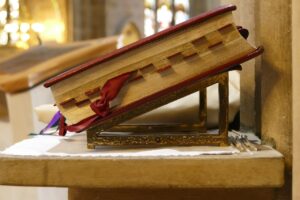Reflection for the “Holy Family of Jesus, Mary and Joseph,” First Sunday after Christmas
Readings:
RM Year C: 1 Samuel 1: 20-22, 24-28; Psalm 84; 1 John 3: 1-2, 21-24; Luke 2: 41-52.
RM alternate readings from Year A: Sirach 3: 2-6, 12-14; Psalm 84; Colossians 3: 12-21; Luke 2: 41-52.
RCL: 1 Samuel 2: 18-20, 26; Psalm 148; Colossians 3: 12-17; Luke 2: 41-52.
Long-time readers of these Reflections may have noticed (…though I hoped they wouldn’t…) that I skipped Holy Family Sunday every year. I’d send a Reflection for Christmas, or for January 1st, but not in between. Maybe it comes from being one of those much maligned “childless cat ladies,” but I couldn’t come up with any authentic, inspiring insights on the Holy Nuclear Family. While I nearly lost a cat once (on a bitter cold New Year’s Eve), I’ve never lost a child.
This year I was inspired and heartened by scripture scholar Dianne Bergant’s exegesis of the readings for this Sunday in the Roman Missal. But they start with the alternate First Reading from the book of Sirach, part of the Hebrew Wisdom tradition, a deuterocanonical book. Two characteristics of this “advice column” are first, that it makes a remarkable balance in the duties and support owed by a child for a parent, almost irrespective of the gender of the parent, within a highly patriarchal society. And secondly, the fact that this advice is not being ladled out to unruly children so they behave themselves and don’t provoke their parents, but to adult children to be faithful to their responsibility to their aging parents.
The author sets up a father/mother parallel:
“God sets a father in honour over his children. A mother’s authority [God] confirms over her sons.”
This says something different and striking when we don’t inclusivize “sons” to “children.” The son is expected to take care of his mother in the absence of her husband, but she still holds authority over him as his mother. Bergant writes,
“The parallel construction … suggests that honor and obedience are due both parents, not just the dominant father. We should not overlook the fact that the text states that the mother has authority over her sons, and that this authority was confirmed by the Lord (vs. 2.) In the face of the androcentric bias found in the text, this point is significant.”
There’s a touching beauty in Sirach’s advice to a son regarding his father, in a family structure that gives the father patriarchal power:
“Even if his mind fail, be considerate of him.”
How directly relevant that can be for us in our own families, and how wrenchingly difficult to do, when you see your mother or father deteriorating in body or mind, or when you struggle with daily caregiving, or try to support an aging parent when you live far away.

The Gospel is the same in both Lectionaries, and interestingly, this story turns as well on a theme of maturity and adulthood. The reason why Jesus could get lost and not be missed for a day was precisely that this was not a nuclear family as we know it today, but a community travelling together to Jerusalem for the Passover feast. Mary and Joseph could assume he was somewhere in the tribe as it headed home, until he couldn’t be found. The second day, they hurried back to Jerusalem. One day out, one day to return. We can feel, in succession their panic, fear, relief, and then their anger and frustration.
In effect, they lost a child, a child on the cusp of adulthood. A child they never fully knew. A twelve-year-old with a prodigious understanding of the complexities and profundities of their religious faith. This may not have been the first time they lost him – we have no way of knowing. And it wouldn’t be the last, when we recall that, many years later, his mother and brothers went out looking for their adult family member to bring this now-notorious wandering preacher home.
And he refused to go. After all, he wasn’t lost.
The popular meme on childless cat ladies claims that we live wretched, miserable lives, and want to make everyone else’s lives miserable too. Utter nonsense. One can learn much from cats – their intelligence, strategic thinking, their affection and empathy for their loved humans, and their ability to get out of the way when everything falls apart. Never disparage cat ladies. We have claws and teeth, and we know how to use them.
© Susan K. Roll
*Dianne Bergant, Preaching the New Lectionary Year C, Liturgical Press, 2000.
Susan Roll retired from the Faculty of Theology at Saint Paul University, Ottawa, in 2018, where she served as Director of the Sophia Research Centre. Her research and publications are centred in the fields of liturgy, sacraments, and feminist theology. She holds a Ph.D. from the Catholic University of Leuven (Louvain), Belgium, and has been involved with international academic societies in liturgy and theology, as well as university chaplaincy, Indigenous ministry and church reform projects.





I was intrigued by your framing the book of Sirach as an “advice column” – and the good advice it gives!
I like your claiming your childless cat-woman identity – and am impressed by the rising swell of cat ladies everywhere.